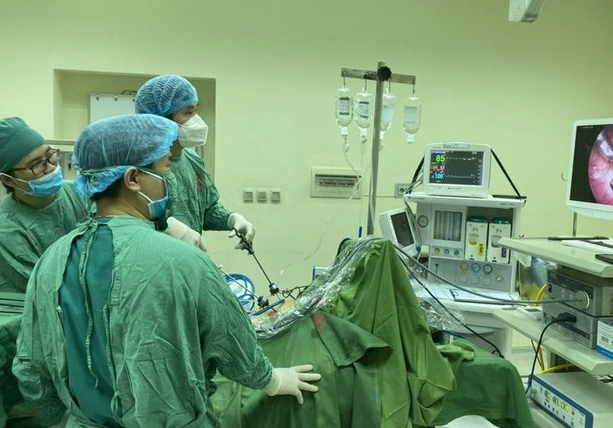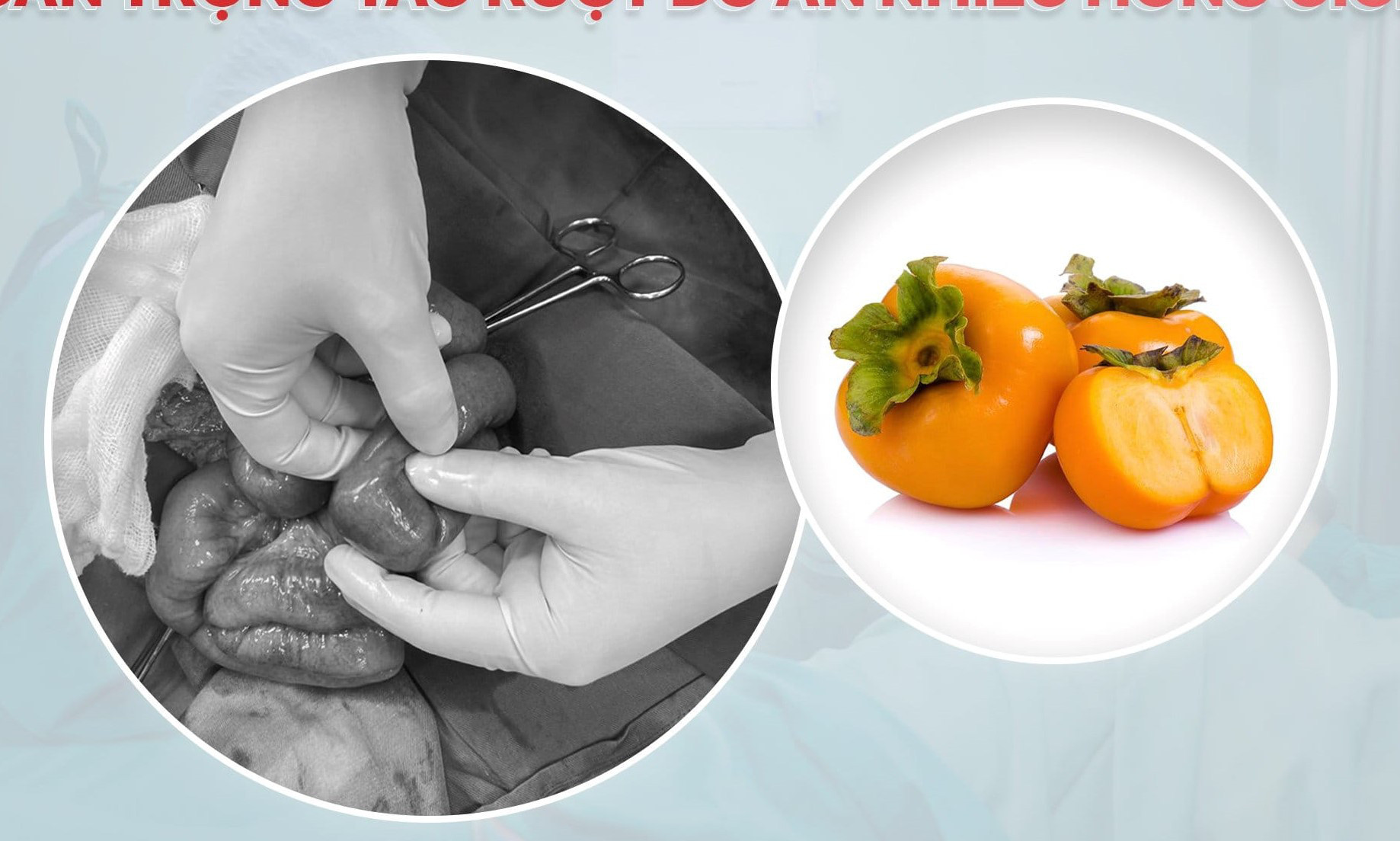Persimmons have many nutritional values for health, but if you do not know how to eat them, many people and many diseases will be in danger of death. Autumn is the season for delicious persimmons, but eating too much can cause intestinal obstruction.

Surgery to remove food cyst causing intestinal obstruction for patient at Vietnam - Sweden Uong Bi Hospital - Photo: BVCC
Nghe An Obstetrics and Pediatrics Hospital has just admitted a patient NTAN (7 years old) with symptoms of dehydration due to frequent vomiting, abdominal pain, and constipation. Examination results revealed many food masses blocking the small intestine and stomach.
A few days before being admitted to the hospital, the child had eaten a crispy persimmon. Doctors performed surgery to push out many blockages in the small intestine and opened the stomach to remove hard, lumpy, large masses that could not go down on their own.

Treatment for a patient with intestinal obstruction due to eating persimmons in Nghe An - Photo: BVCC
Previously, Vietnam - Sweden Uong Bi Hospital also performed surgery to remove 2 food residues in the stomach and 1 food residue in the small intestine for patient D.TC (37 years old, in Quang Ninh). The cause was that 1-2 weeks before, the patient ate 5 persimmons when hungry.
Dr. Dang Quoc Ai, deputy head of the general surgery department at E Hospital, said that every time the season of pickled persimmons comes, many patients have to pay a very high price because the hospital treatment costs tens of millions of dong. There was a time in just half a month that the department had to perform surgery on 3 cases of intestinal obstruction and food tumors due to eating persimmons.
Recently, a 68-year-old female patient (Hanoi) received a lot of pickled persimmons from her daughter, so she ate them every day. As a result, the undigested persimmons accumulated in her stomach.
Endoscopy results revealed 3 food residue masses. The sebum tumor causing obstruction in the small intestine was crushed and pushed down to the colon, 2 masses in the stomach were removed by gastric surgery. When the 2 food residue masses in the stomach were split in half, pink pieces were still visible.
Similarly, a 70-year-old male patient (Hanoi) with a history of 2/3 gastrectomy in 1996 was hospitalized with symptoms of intestinal obstruction. A few days before hospitalization, he ate persimmons. Another 70-year-old female patient (Hanoi) also had intestinal obstruction after 3 days of eating persimmons due to food residue consisting of many masses in the stomach and small intestine.
Dr. Ai said that although persimmons are delicious, they are not a fruit that should be eaten a lot, especially by the elderly, children, and people with stomach problems... Because persimmons contain tannin and pectin acids, which are substances that tighten the intestinal mucosa and affect intestinal motility.
Eating too much, especially when hungry, stomach acid is relatively high, tannins - pectin combined with high fiber content will coagulate under the effect of stomach acid causing bloating, indigestion, stomach pain, even nausea and vomiting.
Eating too much will cause stones in the small intestine, and sebum in the stomach can easily lead to intestinal obstruction. Therefore, absolutely do not eat persimmons when hungry. Especially for the elderly and children, if they eat too much persimmons on an empty stomach, it will easily damage the stomach because of weak digestive function.
Persimmon is a low-calorie fruit that is high in fiber and has many nutrients that are good for your health such as: calories: 118; starch: 31g; protein: 1g; fat: 0.3g; fiber: 6g; vitamin A: 55% RDI (recommended daily intake);
Vitamin C: 22% RDI; vitamin E: 6% RDI; vitamin K: 5% RDI; vitamin B6 (pyridoxine): 8% RDI; potassium: 8% RDI; copper: 9% RDI; manganese: 30% RDI; rich in thiamin (B1), riboflavin (B2), folate, magnesium, and phosphorus, and many plant compounds, including tannins, flavonoids, carotenoids, and more.
Therefore, eating persimmons not only helps boost immunity, is good for digestion (twice as much fiber as other fruits), anti-aging, improves vision, beautifies skin and hair, and fights cancer, prevents heart-related diseases... However, many people find eating persimmons dangerous:
- People with diabetes:Persimmons contain 10.8% carbohydrates, mostly disaccharides and simple monosaccharides, so they are easily absorbed after eating, causing blood sugar levels to increase.
- People with poor health:People with diarrhea, weak body, postpartum women, people who have just recovered from illness, people with poor stomach function, chronic gastritis, indigestion... should not eat persimmons.
- People with constipation: People who are often constipated should also not eat persimmons. Because the tannin in persimmons, when combined with calcium, zinc, magnesium and several other minerals, will become a compound that the body cannot digest.
Eating too much persimmon will increase the sedimentation rate, making it difficult to get rid of large particles, and can form large clumps that can block digestion.
- Gastric bypass:Normally, food is crushed in the stomach before being sent to the small intestine. However, in people who have had their stomachs removed or part of their stomachs removed (where a lot of acid is secreted), cellulose and other substances cannot be digested. The connection between the small intestine and the stomach is large, so the food eaten falls straight into the intestines, clumping together into large pieces that cause blockage wherever they go.
In addition, people with anemia, people taking iron... should also limit eating persimmons because it hinders iron absorption.
Do not eat persimmons when hungry; also avoid eating persimmons with taboo foods such as: alcohol, crab soup, goose meat, sweet potatoes, seafood...
Not only persimmons but also many foods containing tannins, pectin and cellulose can easily cause intestinal obstruction. Therefore, the elderly and children, people who have had a partial gastrectomy, people with dental diseases that reduce chewing function... need to be careful when eating unripe fruits with astringent taste (persimmons, figs, guava...) and foods with a lot of fiber (bamboo shoots, jackfruit...).
You need to get rid of the habit of eating too fast without chewing thoroughly. Do not eat foods that are too rough, tough, hard, difficult to digest, or many types of fiber-rich foods at the same time. Eat foods that are cooked and soft.
When experiencing symptoms of abdominal pain, vomiting, constipation, and increasing bloating, you should go to a medical facility for timely diagnosis and treatment. If intestinal obstruction is not treated promptly, it can be life-threatening.
According to Tuoi Tre